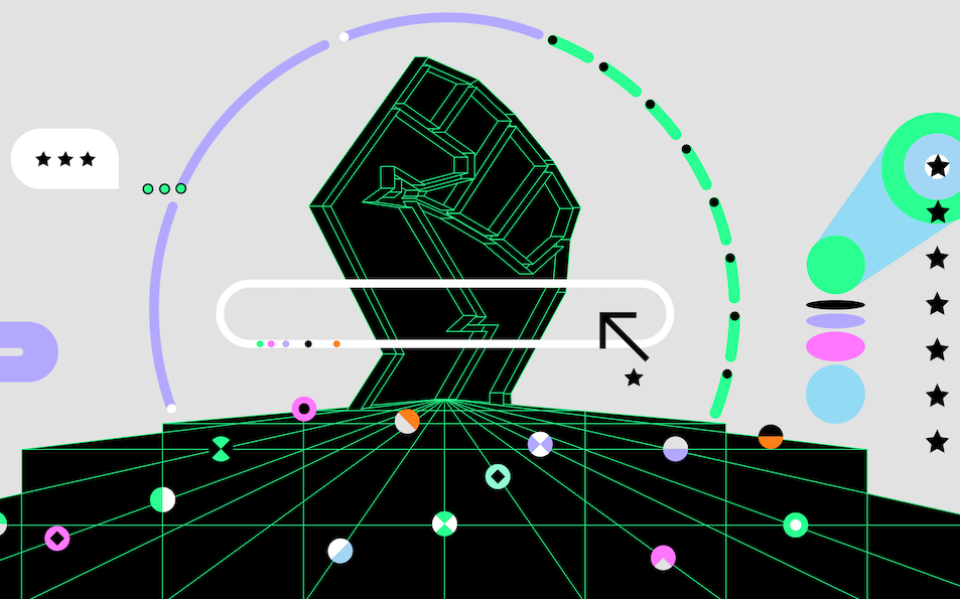
Ilustración de Rainbow Unicorn para Mozilla.
What can be done to make the internet healthier? Some of the most compelling answers arise in the very communities that experience the worst online violence plaguing the internet. By shining a light on countless initiatives led by feminists groups and LGBTQ+ communities, a portrait begins to emerge of what a healthier internet could look like.
It’s an internet where we defend safe spaces; where we stand together to demand accountability for abuse; and where the invisible is made visible for equality and justice to prevail. Neither big tech nor policymakers have ever done enough to stem the tide of online violence. The counter-power from people’s organizations will be the key to unlocking better and more innovative ways to make the internet safer and more inclusive.
Some of the most compelling answers arise in the very communities that experience the worst online violence plaguing the internet.
Mozilla’s annual Internet Health Report has logged many stories of such achievements over the years, including several that explore creative and expansive ways to respond to gender-based violence. Below, I have chosen just three that are worth celebrating. If we are to inspire action for a healthier internet, as a movement, we must take inspiration from initiatives that connect people with convergent values and ideas.
A safe space for LGTBQ+ communities online
In 2018, we shared the story of the online community Ahwaa (in Arabic, Passions) in the Internet Health Report as a positive example of how the internet can offer spaces for free expression and human connection. Ahwaa is a community devoted to creating a secure space for LGBTQ+ people in the Arab world. The community thrives and maintains both its safety and the quality of the conversations they foster by staying relatively small. As its founder Esra’a Al Shafei explained: “Platforms don’t need to be used by millions of people to be effective and influential. There’s nothing stopping us from creating our own niche spaces online. The opportunities are limitless.”
“Platforms don’t need to be used by millions of people to be effective and influential. There’s nothing stopping us from creating our own niche spaces online. The opportunities are limitless.” — Esra’a Al Shafei
An anonymous member of Ahwaa was quoted on TED in 2018 in the context of an interview with Esra’a who is a human rights activist from Bahrain: “Reading posts made by people going through problems so similar to mine really helped me out and comforted me too, seeing how I can’t really talk about my issues to people nearest and dearest to me”, they said.
Ahwaa is a community resource and an antidote to violence on the internet, in large part thanks to encryption because the technology makes conversations possible that would not otherwise be safe in many societies. Without encryption, Esra’a said, “we [wouldn’t] have that level of anonymity. Then we simply can't exist online. And sometimes that might mean not exist in [real] life.”
‘Gamification’ is another strategy employed by Ahwaa. The forum is organised in levels, and users earn points through positive interactions that afford them increasing access and discouraging bad actors.
“Ahwaa has been growing steadily over the years, and we're currently in the process of building a way for users to access on-the-ground resources more securely and efficiently,” says Esra’a, adding that creating offline connections grew to be an urgent need during the pandemic. “We're also exploring more ways to significantly strengthen the architecture of Ahwaa to help build and reward trust and solidarity among its community, as well as continuous security improvements.”
Breaking the silence to amplify women’s voices
The global ripple effects of the #metoo movement has inspired similar online organising by women against sexual violence under many additional names.
Some examples were shared in the 2020 Internet Health Report as part of a feature where 100 people shared a "healthy" and "unhealthy" moment for the internet in the past year.
Nyamishana Prudence recalled Uganda’s response to #metoo, where survivors of violence shared their stories and how feminist organizations seized the moment to expand the conversation towards concrete strategies. The Pan-African women’s rights group, Akina Mama wa Afrika, for example, initiated a dialogue with the media on how to report sexual violence in a more humane way. Other hashtags guiding the Ugandan conversation in 2020 were #DismantlePatriarchyFriday and the #OneAskCampaign, which encouraged people to share stories of experiences with harassment while getting acquainted with little known sexual harassment policies.
Another ‘healthy’ moment, in Egypt, was recalled by Wafaa Heikal. Here, a young student at the American University of Cairo, Nadeen Ashraf, created an Instagram account called undefined to denounce a man who had been repeatedly accused of harassment. Within a week, the man had been arrested and undefined had over 70,000 followers. “I was definitely taken aback by how quickly the campaign grew and how seriously it was taken. It truly healed this sense of hopelessness I had always felt about the sexual violence in my community, and I began to think that maybe we just never confronted the issue correctly in our society,” she told Egyptian Streets’ Farah Khairat.
The global ripple effects of the #metoo movement has inspired similar online organising by women against sexual violence under many additional names.
Others Egyptian campaign inspired by #metoo had preceded this one, but some women suffered harsh consequences for speaking out, particularly when the government found itself at the centre of the story. In a different turn of events, however, online denunciations were followed by a change in legislation, to protect the identity of women coming forward to report sexual harassment.
As in many other waves of protests that have taken to online media, so many of these conversations do lead to watershed moments. The road is long and complex, and the backlashes for women speaking up online can be fierce, but more spaces are opening up, where women and LGBTQ+ folks push forward towards victories.
Creating knowledge
The global nature of gender-based violence on the internet is unfortunately well known. What is fascinating, is the depth and creativity with which different groups and organizations work to document and diagnose it. These efforts help lead to forward-thinking strategies aimed for better security, prevention and education. Many of the stories shared by contributors to the Internet Health Report were connected to research that foregrounds the experience of people of diverse genders and social backgrounds, as opposed to disregarding them entirely.
Women do encounter complex limitations that reduce their agency online; but efforts to empower women of different backgrounds and give them tools to flourish, continue to proliferate. More and more studies call out online violence and force a light on it. The strategies to think about feminist technology futures grow in number and creativity. Such efforts, devoted to creating knowledge, take many shapes: from Mindi Seu’s Cyberfeminism Index centering people of many genders, mostly from the Majority World, to Coding Rights’ card game, one that was created to help us imagine alternative, feminist technologies.
The global nature of gender-based violence on the internet is unfortunately well known. What is fascinating, is the depth and creativity with which different groups and organizations work to document and diagnose it.
We believe these chains of community efforts and knowledge-sharing will continue to appear and strengthen one another. There have been many instances in which organising, sharing and protesting has been uncontainable. A constellation of evolution, acknowledged and unacknowledged, that are constantly taking place, evolving and fuelling other networks. We can help pave the way for others to build on their work by sharing the stories of what makes them true catalysts for change.
This article was written in collaboration with Mozilla’s Insights and with editorial assistance from Solana Larsen
- 4055 views






Add new comment